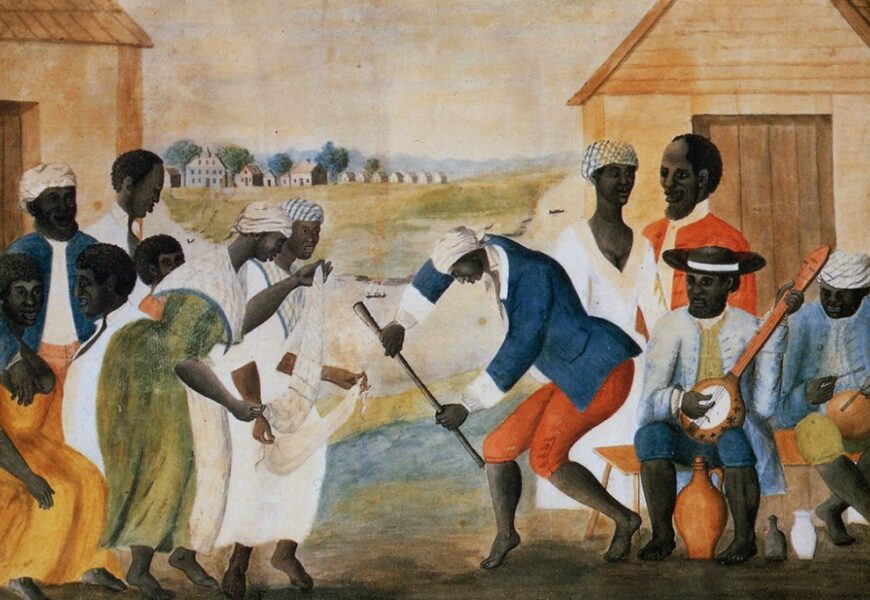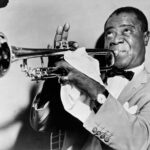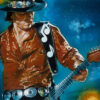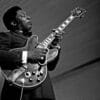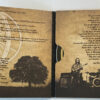Blues music originated as a response to the hardships endured during slavery. It evolved from African spirituals and work songs sung by slaves.
Blues music, with its deep roots in African American history, is a rich expression of the soul. It began in the American Deep South, principally from the experiences of slaves brought from Africa. The melodies and rhythms of their traditional music fused with the narrative of their lives in servitude to form the early blues.
These songs served as a form of emotional and spiritual release, enabling slaves to preserve their heritage and express anguish. The call-and-response pattern from African traditions became a staple in blues music, providing a personal and communal voice to their stories. The genre gradually evolved through the post-slavery era, embedding itself as a cornerstone of American music culture. It influenced the development of other genres, making it a vital part of music history and a profound legacy of resilience and creativity.

Credit: www.urbanmilan.com
The Origins Of Blues Music
The Origins of Blues Music trace back through the corridors of time, echoing the tales of struggle and expression. It’s a genre deeply rooted in the African-American experience, a musical form born from the desire to convey emotion and tell powerful stories. It’s a history that cannot be untangled from the legacy of slavery and the enduring spirit of resilience these communities showed throughout those dark times. As we delve into the origins of Blues, we uncover the layers of influence that have shaped this genre.
African Music Influences
The rhythmic heartbeat of Blues music pulses with African tradition. African music, characterized by its use of polyrhythms, call-and-response patterns, and communal participation, played a foundational role in shaping the early Blues sound.
- Call-and-Response: Entwined in many Blues songs, it’s a direct nod to African vocal traditions.
- Polyrhythms: Complex layers of rhythm also trace back to African music.
- Blues Scale: It derives from the pentatonic scales found in African melodies, incorporating the expressive “blue notes.”
Influence Of African-american Spirituals
African-American spirituals offered a form of emotional and sometimes encoded communication. These songs became a vital part of the journey, ultimately influencing the Blues genre:
| Characteristic | Impact on Blues |
|---|---|
| Lyric Themes | Expressive stories of pain, hope, and the search for freedom. |
| Improvisation | Freedom in musical expression, a hallmark of Blues performances. |
| Sorrowful Tones | The soulful, melancholic sounds that define the Blues feeling. |
Folk Music Traditions
Folk traditions carried by slaves, and later sharecroppers, infused their music with storytelling. Blues was thus shaped by the narrative quality of folk:
- Storytelling: Blues music often tells a gripping tale, a feature brought from folk songs.
- Acoustic Instruments: The use of homemade and accessible instruments like the guitar and harmonica found their place in Blues.
- Personal Experience: Singers drew on their life stories to create authentic, relatable lyrics.
The Impact Of Slavery On Blues Music
The Impact of Slavery on Blues Music is profound. Blues, a genre that speaks volumes of African-American history, is deeply rooted in the experiences of slavery. It is a reflection of hardship and the enduring spirit of a people. This music bieds solace, strength, and sometimes, a powerful form of resistance against oppression.
Expression Of Pain And Suffering
Blues music stands as a poignant testament to the pain and suffering endured by slaves. Lyrics often tell stories of loss, despair, and longing for freedom, set to melancholic tones that resonate with the hard truths of a brutal past. Singers use their voices as a tool to convey the deep-seated emotions that words alone cannot express.
Mapping The Journey From Africa
- Rhythmic Influences: African rhythms found new life in Blues.
- Instruments: Banjos and drums echoed African beats.
- Scales: The pentatonic scales in Blues trace back to African melodies.
Each element within Blues music provides a sonic map of the heartbreaking journey from Africa to the American South.
Spiritual Release And Catharsis
Blues was more than music; it was a spiritual release. It allowed slaves to preserve their identity and humanity in the face of oppression. Through the act of creating and sharing blues music, slaves could achieve a sense of catharsis, momentarily freeing themselves from their bonds through song and dance.
Slave Songs As A Foundation Of Blues
The roots of blues music stretch deep into the soil of African American history, with slave songs laying the groundwork for what would become a quintessential American genre. These spirituals, shouts, and hollers formed a musical lifeline that communicated not just the sorrows of enslavement but also resilience and resistance. We’ll delve into the significant elements that contributed to the foundation of blues: Field Hollers, Work Songs, and Ring Shouts.
Field Hollers
Field Hollers were the earliest form of slave music, echoing across plantations as a form of communication and expression. These powerful vocalizations helped coordinate labor and express personal feelings. The characteristic call-and-response pattern in Field Hollers is a clear precursor to the blues sound, highlighting the connection between emotion and music.
Work Songs
The rhythm of Work Songs kept the pace during hard labor. These songs often had a steady beat, mirroring the activities like hammering or chopping. Work Songs served as both a distraction from toil and a way to build solidarity among slaves. The repetitive and rhythmic nature of these tunes is echoed in blues rhythms.
- Maintained rhythm in labor
- Encouraged unity
- Shared communal experiences
Ring Shouts
Ring Shouts combined dance and music in a circular motion, often during worship gatherings. This practice allowed slaves to maintain elements of African traditions, blending them with Christian hymns. The Ring Shout’s percussive footwork and chants clearly influence the stomps and claps found in blues music.
- Revolved around worship
- Preserved African cultural elements
- Influenced blues’ rhythm and claps
The Legacy Of Slavery In Blues Lyrics
Blues music is a deeply emotive genre that emerged from the African American experience of slavery and oppression. Its lyrics are more than melodies—they are stories from souls long troubled by hardship. As we delve into the heart of these songs, we uncover the powerful influence of slavery on the blues tradition.
Themes Of Oppression And Injustice
Blues lyrics often reflect the bitter reality of racial unfairness and the struggle for dignity among slaves and their descendants. These stories, sung with raw honesty, paint a stark picture of the harsh daily life experienced by African Americans for centuries.
- Hard labor and punishment
- Lack of freedom
- Struggle for survival
Narratives Of Freedom And Escape
Despite the cruelty faced, blues songs often carry a message of hope and resilience. They tell tales of liberation and the undying desire for a life beyond the constraints of injustice. Lyrics infused with dreams of escape and emancipation become anthems for those yearning for a new beginning.
- Songs about the Underground Railroad
- Dreams of a promised land
- Aspirations for equal rights
Symbolism And Metaphors
In blues music, songwriters often use symbols and metaphors to express the emotions and experiences that words alone cannot capture. Images like chains, crossroads, and storms signify deeper meanings related to the legacy of slavery.
| Symbol | Meaning |
|---|---|
| Chains | Bondage and restriction |
| Crossroads | Decisions and fate |
| Storms | Turmoil and change |
The Role Of Instruments In Blues Music
Blues music tells a story. It rose from the depths of the African-American experience, particularly during slavery times. The melodies are beleaguered echoes of souls yearning for freedom. Instruments played a huge part in how these narratives were told. They became tools of expression in the hands of those who had few other means to share their stories and emotions.
Improvisation And Innovation
A key feature of blues music is its raw creativity. Players would improvise, pulling sounds from their hearts. They didn’t always have traditional instruments at hand. They innovated using whatever was available. Items like the diddley bow and the cigar box guitar are perfect examples.
Adaptation Of Traditional African Instruments
- African slaves brought musical traditions with them.
- They repurposed objects to mimic these instruments.
- Drums, banjos, and other rhythmic instruments influenced early blues.
Influence Of European Instruments
Blues wasn’t just built on African influences. European instruments like the guitar and piano also made a vital impact. Enslaved musicians adapted these to their unique styles, bending notes and creating the distinctive sounds we recognize in blues today.
The Development Of Blues Styles
Blues music has deep roots in the African-American history of slavery. Its development reflects a journey of expression and storytelling. Initially, Blues was a folk music that painted pictures of the everyday struggles and emotions of African Americans. Over time, this genre evolved into distinct styles, mirroring the soulful history and diverse experiences of its creators.
Country Blues
Often called “folk blues,” Country Blues is the earliest form of blues music. It emerged directly from the African-American experiences of oppression and resilience. This style spread across the Southern United States. Country Blues is characterized by its solo performances with artists using acoustic guitars. Notable figures include Robert Johnson and Son House, who left a lasting impact on Blues and music overall.
Urban Blues
As African Americans migrated to urban areas, particularly Chicago and Detroit, the Blues evolved into a more amplified and electric sound. This style, known as Urban Blues, became popular in the 1940s and 1950s. Larger bands and electric instruments created a more sophisticated sound. The legendary Muddy Waters and Howlin’ Wolf are two giants of Urban Blues. They influenced many rock musicians that would follow.
Delta Blues
Originating in the Mississippi Delta, Delta Blues is one of the oldest blues styles. It’s renowned for its raw, emotional depth and simple, but powerful instrumentation. Delta Blues artists often used slide guitars and harmonicas. Charley Patton and Robert Johnson are Delta Blues icons. Their music tells stark stories of life in the Deep South.
Prominent Figures In The Evolution Of Blues
The blues genre is a tapestry, rich with emotional depth, born directly from the experiences of slavery and the subsequent life of African Americans in the South. It was the foundation for what would become a quintessential component of American culture. Along its journey, certain individuals stand tall, having paved the way and defined the sound of blues music as we recognize it today. Let’s celebrate some of these pioneering artists whose talents and stories helped to shape the blues.
W.C. Handy SectionW.c. Handy
Often referred to as the “Father of the Blues”, W.C. Handy played a monumental role in bringing blues music to the mainstream. Born in the late 19th century, his signature song, “St. Louis Blues”, stands as a testament to the genre’s broad appeal. Handy’s influence stretched beyond his music; his work in documenting blues songs gave the world a lasting treasury of early blues compositions.
Bessie Smith SectionBessie Smith
Dubbed the “Empress of the Blues”, Bessie Smith captured the hearts of many with her powerful vocals and commanding presence. Her songs often spoke of personal struggles and were reflective of the African American spirit. With a career that skyrocketed in the 1920s, Smith is remembered as one of the finest blues vocalists of all time. Her rendition of “Downhearted Blues” is an enduring classic.
Robert Johnson SectionRobert Johnson
Robert Johnson’s mystique is as potent as his musical influence, with legends swirling about his fabled deal with the devil at a Mississippi crossroads. His masterful guitar skills and haunting voice produced blues anthems like “Cross Road Blues” and “Sweet Home Chicago.” Despite a brief life, Johnson’s profound impact on the blues, and on later rock and roll, secures his place as an iconic figure in music history.
The Popularization Of Blues Music
Blues music, deep-rooted in the experience of African American slavery, found its voice in the early 20th century. It journeyed from the cotton fields to the heart of American culture. This transition owed much to recordings, radio, migration, and its profound influence on rock and roll.
Recordings And Radio
The first blues recordings in the 1920s brought this genre to a broader audience. Phonographs and record players became household staples, allowing people from all walks of life to experience the soulful sounds of blues. Radio further amplified its reach, with stations broadcasting live performances and recorded blues music across the nation. This exposed a diversity of listeners to the genre’s raw emotion and storytelling.
Migration And Urban Centers
As African Americans moved to urban centers in search of a better life, they brought the blues with them. This migration created cultural melting pots in cities like Chicago and Memphis, where the blues evolved. The music became louder and more electric, mirroring the energy and challenges of urban life. Blues clubs popped up, becoming cultural landmarks and launching many artists to fame.
Influence On Rock And Roll
- Blues laid the foundation for rock and roll, with early rock musicians drawing heavily from blues scales, chords, and themes.
- Icons like Chuck Berry and Elvis Presley blended traditional blues with new rhythms, creating a sound that changed music forever.
- The beat, passion, and soul of blues music beat at the heart of rock and roll, influencing generations to come.
The Resurgence Of Blues In The Civil Rights Movement
Blues music found new life during the Civil Rights Movement. This was a time for change. People fought for rights and equality. Blues tunes matched their struggles and hopes. This music became a tool. A tool for freedom and saying ‘No more’ to injustice.
Songs Of Protest And Resilience
Blues songs were more than music. They were voices for those unheard. Singers like Muddy Waters and Bessie Smith sang of pain and power. Each song told a story. A story of fighting back and not giving up. The lyrics spoke of life stories, trials, and the strength to endure.
Empowerment Through Music
With every chord, blues music gave strength. This music gave people hope. For many, it was a comfort. It said, “You are not alone.” Listeners found the courage to stand tall. Their spirits lifted by rhythms and beats. Together, they fought stronger.
Blues As A Cultural Statement
Blues was more than sound; it was a stand. It captured the heart of a movement. The Civil Rights era echoed with its melodies. These songs were anthems. They told of heritage and the unyielding desire for change. The blues became a symbol of pride and unity.

Credit: www.independent.co.uk
Blues Music Today
Blues Music Today remains a powerful echo of its ancestral roots in slavery. It has evolved, but it still holds the emotion and storytelling that were its lifeline during those trying times. People from all walks of life continue to find solace and expression in blues music, as it seamlessly adapts to modern sensibilities and the ever-changing musical landscape.
Influence On Contemporary Genres
The influence of blues is undeniable in today’s music scene. Here’s a glance at its impact:
- Rock & Roll: Legends like The Rolling Stones drew heavily from blues.
- Hip-Hop: Rappers sample blues beats and narratives.
- Jazz: Blues scales are jazz music’s heartbeat.
Preserving Blues Traditions
Preservation of blues music keeps cultural heritage alive:
- Dedicated museums display blues’ rich history.
- Music programs teach the blues to new generations.
- Artists and bands keep traditional blues styles thriving.
Blues Festivals And Community
Blues festivals bring fans and musicians together, celebrating this genre’s community spirit:
| Festival Name | Location | Highlights |
|---|---|---|
| Chicago Blues Festival | Chicago, IL | World-renowned artists gather in the genre’s birthplace. |
| King Biscuit Blues Festival | Helena, AR | Features performances that honor Delta blues origins. |
| Mississippi Delta Blues Festival | Greenville, MS | One of the oldest blues festivals celebrates regional styles. |
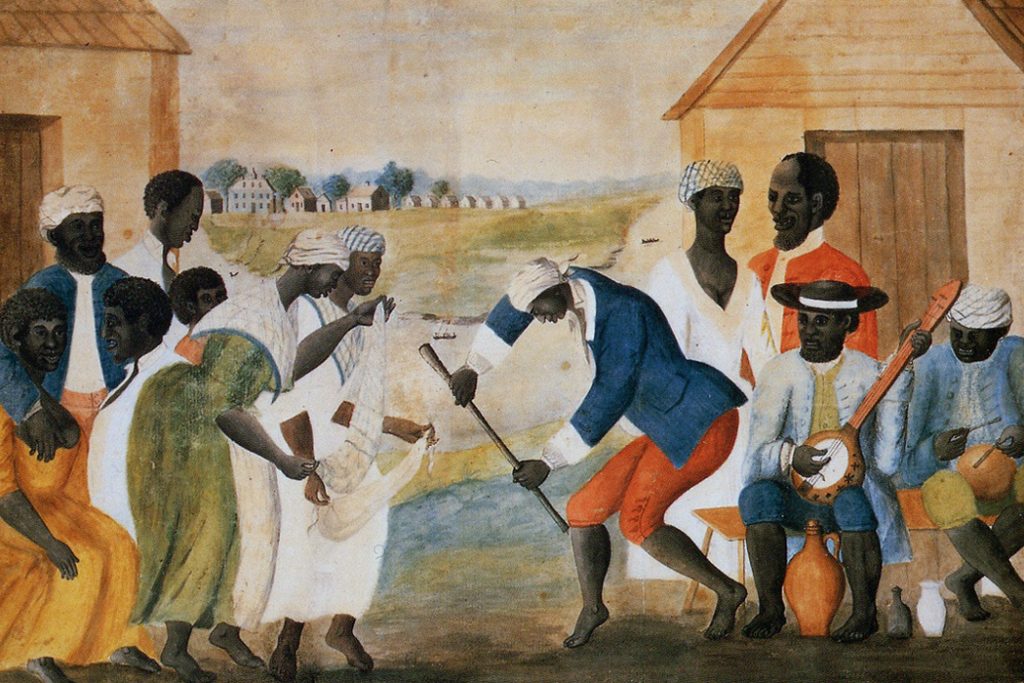
Credit: flypaper.soundfly.com
Frequently Asked Questions Of How Did Blues Music Come From Slavery
How Is Blues Music Related To Slavery?
Blues music originated in the African-American communities, deeply influenced by the experiences of slavery. It reflects the hardships, emotional struggles, and the quest for freedom that slaves endured.
What Music Originated From Slavery?
Blues and spirituals are genres that originated from African American slavery. These musical forms express the hardships and spiritual resilience of enslaved people.
Was The Blues Music Created By Africans?
Blues music originated from African American communities, with roots in African musical traditions and spirituals.
Did Blues Music Originated From Slaves Working In The Cotton Fields?
Yes, blues music has its roots in the experiences of African-American slaves, particularly in the Deep South, including work songs from the cotton fields.
What Is Blues Music’s Origin Story?
Blues music originated from the African American experiences of slavery and oppression, forming into a distinct genre by the late 19th century.
How Did Slaves Contribute To Blues Music?
Slaves infused their songs, spirituals, and field hollers with African musical traditions, laying the groundwork for blues music.
What Elements Of Slavery Influenced Blues?
The call-and-response patterns, emotive intonations, and narrative lyrics in blues trace back to African American slave songs and spirituals.
How Did The Emancipation Of Slaves Affect Blues Music?
Post-emancipation, freed African Americans used blues to express newfound freedoms and the ongoing struggles of Reconstruction and segregation.
Are Blues Scales Rooted In African Music?
Yes, blues scales incorporate flattened notes, resembling pitches common in African music and used in slave folk songs.
What Role Did Mississippi Delta Play In Blues History?
The Mississippi Delta is considered the birthplace of blues, where early artists shaped the genre utilizing experiences of Southern black communities.
Conclusion
The indelible imprint of blues music is a testament to the resilience of the human spirit. Birthed from the hardships of slavery, its echoes shape our contemporary soundscape. May this journey through blues history illuminate its profound legacy and inspire continued appreciation for its enduring impact.

